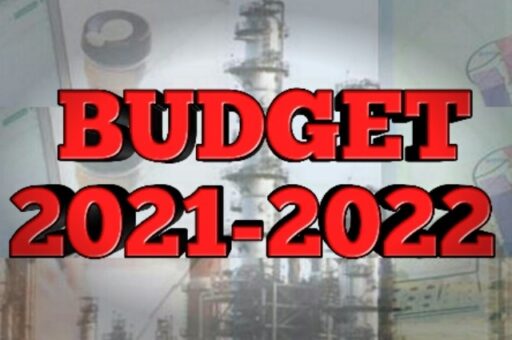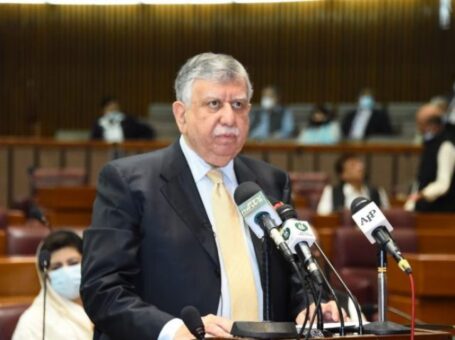ISLAMABAD: The federal government on Friday announced budget for fiscal year 2021/2022 and notified relief and revenue measures in income tax.
REVENUE MEASURES
• Special regime for export of services at par with export of goods to be taxed @ 1% under final tax regime.
• Elimination of block taxation of property income and shift to normal tax regime.
• Reduction of block taxation on capital gain on disposal of immoveable properties if gain exceeds Rs. 20 million.
• Reduction in block taxation on interest income, if it exceeds Rs. 5 million.
• Tax on “on” money on vehicles, if vehicle is disposed without registration.
• Expansion of scope of withholding tax collection from supply chain below manufacturers and importers of specified sectors (sections 236G and 236H).
• Reduction in threshold of monthly electricity bill for withholding tax on electricity consumption from 75,000 to 25,000 from domestic users not appearing on Active Taxpayers’ list.
• Removal of requirement of issuance of separate notice in concealment cases.
• Withholding of tax on rental income of sub-lessee.
• Broadening of scope of withholding agents for the purpose of collection of withholding tax on commission income (section 233).
• Streamlining withholding tax collection on sale and purchase of immoveable property (section 236C and 236K).
• Rationalization of withholding tax regime for exporters.
• Taxability of profit on debt component of GP fund and other such funds.
• Withdrawal of personal income tax exemptions.
• During the current financial year, Tax Laws (Second Amendment) Ordinance, 2021was promulgated to implement corporate income tax reforms to provide level playing field to all businesses. Certain tax credits, concessions and exemptions were withdrawn. The provisions of the Ordinance have been made part of the Finance Bill.
RELIEF MEASURES
• Deletion of 12 withholding taxes
Sections of Income Tax Ordinance, 2001
153B: Collection of tax on payment of royalty to residents.
231A: Collection of tax on cash withdrawal.
231AA: Collection of tax on banking instruments.
236P: Collection of tax on banking transactions other than through cash.
236Y: Collection of tax from persons remitting amounts abroad through credit or debit or prepaid cards.
236B: Collection of tax on domestic air travel.
236L: Collection of tax on international air travel.
236V: Collection of tax on extraction of minerals.
233A: Collection of tax from members by a stock exchange registered in Pakistan.
233AA: Collection of tax on marginal financing by NCCPL.
234A: Collection of tax from CNG stations.
236HA: Collection of tax on certain petroleum products.
• Merging of 3 withholding taxes with other existing provisions
Merged with
150A: Deduction of tax on return on investment in Sukuks.
Proposed to be merged in section 151 for residents and in section 152 for non-residents which deal with such payments.
152A: Deduction of tax on payments for foreign produced commercials.
To be merged with section 152 which deals with payments to non-residents.
236S: Collection of tax on dividend in specie.
To be merged with section 150 which deals with dividend.
• Reduction in generalized rate on Minimum Tax on Turnover basis and increase in threshold for individuals and AOPs for chargeability of minimum tax.
• Broadening of scope of IT services by inclusion of cloud computing and data storage services.
• Exemption to Special Economic Zone Enterprises from payment of minimum tax.
• Ten year tax exemption for Special Technology Zone Authority, Zone Developers and Zone Enterprises.
• Tax exemption on the import of capital goods and dividend income of private funds from investment in special technology zone enterprise.
• Introduction of special tax regime for manufacturing SMEs.
• Exemption from tax on income of deep conversion new refineries and BMR projects of existing refineries for 10 years.
• Reduced rate of withholding tax of 3% on oilfield services, warehousing services, logistic services, collateral management services and telecommunication services.
• Inclusion of telecommunication services in definition of industrial undertaking.
• Exemption to Electronic warehousing receipts traded on Pakistan Mercantile Exchange.
• Allowance of provincial WWF and WPPF as a deductible allowance while calculating income.
• Adjustment of business loss against property income.
• Unconditional grant of exemption from tax to certain organizations.
• Withdrawal of power of Commissioner to reject advance tax estimates presented by taxpayer.
• Non recognition of gain/loss on disposal of assets to non-residents under gift from relative, inheritance and agreement to live apart.
• Reduction in tax rate on capital gain tax on disposal of securities from 15% to 12.5%.
• Withdrawal of power of tax authorities to conduct inquiry under section 122(5A).
• Inclusion of live animals, raw hides and unpackaged meat in definition of agriculture produce.
• Reduction in tax liability by 25% for women entrepreneurs.
• Exemption from tax on import of books and agriculture equipment.
• Exemption from tax for bagasse fired power generating units and reduced rate of tax on dividend income from such projects.
• Extension in time limits for availing tax benefits under section 100D and Eleventh Schedule vide Income Tax (Amendment) Ordinance 2021 dated 21.02.2021 made part of the bill.
• Tax exemptions and concessions for Roshan digital accounts and implementation of electric vehicles and mobile phone policy implemented vide Tax Laws (Amendment) Ordinance, 2021 dated 11.02.2021 made part of bill.
STREAMLING MEASURES
• Strengthening mechanism of Alternate dispute resolution.
• Elimination of requirement of filing of application for automated issuance of refund.
• Introduction of time limitation for disposal of show cause notices.
• Recording of e-hearing to be admissible evidence.
• Automated issuance of exemption certificates if application is not disposed by Commissioner within 15 days.
• Removal of requirement of updating tax profile.
• Clarity regarding taxation of income of co-operative societies from sale and services to its own members.
• Delegation of power of Federal Government to Board with the approval of Federal Minister in-charge.
• Extension of time limitation for issuance of notice for filing of return in case of foreign income or foreign assets.
• Time limitation for completion of assessment in pursuance of orders of the Commissioner.
• Streamlining measure for monitoring of withholding taxes requiring taxpayers to file online statement along with reconciliation.
• Establishment of Directorate of compliance Risk Management in FBR.
DOCUMENTATION MEASURES
• Tax credit on installation of point of sale machines.
• Notification of business bank accounts made mandatory.
• Measures for the documentation of business of used cars.
• Harmonization of procedure for investigation and prosecution of offences under domestic tax laws.

